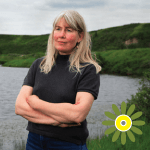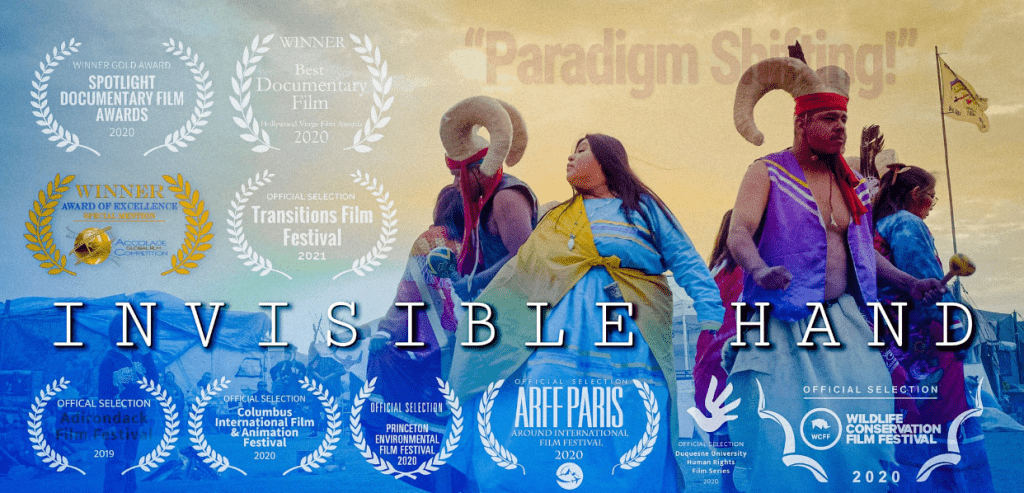“The corporate goal is to make sure democracy doesn’t exist.”

As you watch this documentary, remember: Alberta Energy Regulator (AER) is 100% corporate-funded, owes Albertans no duty of care, is legally immune, has no public health or public interest mandate, and our courts – including the Supreme Court of Canada – used my lawsuit and frac’d rights to put AER above Canada’s Charter of Rights and Freedoms, supposedly our country’s top law.
Invisible Hand is a powerful force of love, community and perseverance, but it was brutal for me to watch because of the cowardly betrayals by my ex lawyers, Murray Klippenstein and Cory Wanless. They abruptly quit my lawsuit 2.5 years ago, abandoning me, my water, and the public interest, after blowing hundreds of thousands of my life-long saved dollars, $75,000 in kind donations from around the world, and 11 years of my life, while lying and refusing to return to me my case files.![]()
Invisible Hand by Joshua B. Prebanic & Melissa A. Troutman, narrated by Mark Ruffalo, portrays the reason for regulators (like PA DEP, USA EPA, Canada’s CER and Alberta’s AER – by granting permits, to legalize harms corporations do to us, our environment, drinking water and communities), the struggle of communities to protect themselves from harmful corporate projects and the rise of the Rights of Nature Movement.
The Indiana County Federation of Democratic Women—longtime supporters of the East Run Hellbenders Society– is sponsoring this viewing event.
There will also be a Live Q & A with Stacy Long and Chad Nicholson – Monday, Mar. 1 at 7:00 PM Eastern Time.
The film documents the seven-year long fight that Grant Township citizens had with Pennsylvania General Energy Company (PGE) and EPA about the rights of nature. The citizens’ group passed a ban on frac waste injection wells to protect their water and environment, then were sued by the company and “regulator.” The community stood together to win and keep frac waste out, but the company is suing the group, again.
Watch the film here: https://www.invisiblehandfilm.com/indianacountyfdw/
Available to watch free from 4pm on Feb 28 until 7pm on March 1.
Live Q & A with Stacy Long and Chad Nicholson
Monday, Mar 1 at 7:00 PM Eastern Time
Link: https://iupvideo.zoom.us/j/99377649728
Or phone: (312) 626-6799 or (646) 558-8656 (both toll calls)
Meeting ID: 993 7764 9728


Refer also to:
2021 02 24: Quebec’s Magpie River becomes first in Canada to be granted legal personhood

The Magpie River in Côte-Nord, Que., is the first in Canada to granted legal personhood rights. Photo by Boreal River
In a first for Canadians, a river in Côte-Nord, Que., has been granted legal personhood by the local municipality of Minganie and the Innu Council of Ekuanitshit.
The Magpie River, (Muteshekau-shipu in the Innu Coet) is an internationally renowned whitewater rafting site, winding nearly 300 kilometres before emptying into the St. Lawrence. The river has one hydroelectric dam managed by Hydro-Québec, and environmental groups have long sought a permanent solution to protect the river from further disruption.
It is unclear how this will affect attempts to build developments on the river, including dams, moving forward, as legal personhood for nature doesn’t exist in Canadian law and could be challenged in court. Minganie, Innu council and several environmental groups — collectively called the Alliance — hope international precedents set in New Zealand, Ecuador and several other countries will help pressure the Quebec government to formally protect the river.
“This is a way for us to take matters into our own hands and stop waiting for the Quebec government to protect this unique river,” explained Alain Branchaud, executive director of the Canadian Parks and Wilderness Society, Quebec chapter. “After a decade of our message falling on deaf ears in government, the Magpie River is now protected as a legal person.”
In accordance with Innu customs and practices, the Alliance has granted the river nine rights:
1) the right to flow;
2) the right to respect for its cycles;
3) the right for its natural evolution to be protected and preserved;
4) the right to maintain its natural biodiversity;
5) the right to fulfil its essential functions within its ecosystem;
6) the right to maintain its integrity;
7) the right to be safe from pollution;
8) the right to regenerate and be restored;
and perhaps most importantly, 9) the right to sue.
“This is a paradigm shift,” said Yenny Vega Cárdenas, president of the International Observatory on the Rights of Nature, which drafted the resolutions in collaboration with the Alliance.
“In environmental law, as it is now, nature is just an object that humans can exploit at their pleasure. Now we’re recognizing that the river has its own rights; that we’re part of the same ecosystem.”
This move follows a larger trend in environmental movements around the world, most notably in Ecuador and New Zealand. In 2011, a provincial court in Ecuador became the first to legally recognize the rights of nature when they ruled in favour of the Vilcabamba River against damaging road construction. In 2017, the Whanganui River on New Zealand’s North Island was the first in the world to be granted legal personhood.
Jean-Charles Piétacho, chief of the Innu Council of Ekuanitshit, said he was partially inspired after visiting the Whanganui River, which is sacred to New Zealand’s Indigenous Maori. Hearing of their decades-long fight to have the river legally recognized by the New Zealand government gave him hope that Canadians might do the same.
“We are not the owners of the river,” Piétacho said. “The Innu of Ekuanitshit have always been the protectors of the Nitassinan (ancestral territory) and will continue to be so through the recognition of the rights of the Muteshekau-shipu River.”
Despite a 2017 promise from Hydro-Québec that it would not construct any more dams on the river, government emails shared with Canada’s National Observer revealed there remained internal opposition to protecting the river given its potential for future energy projects.
When asked pointedly if granting legal personhood to the river would protect it against further destruction by Hydro-Québec, Luc Noël, prefect of Minganie, said with certainty, “There will be no more Hydro-Québec dams on the Magpie River.”
The Magpie River in Côte-Nord, Que., is the first in Canada to be granted legal personhood. #Indigenousrights #nature
The announcement comes just two months after Quebec inched past its 2020 goal of providing environmental protections for 17 per cent of its natural territory, a number set by the UN Convention on Biological Diversity in 2015.
“The recognition of the rights of nature is a growing global movement, and Canada is joining it today with this first case,” said Vega Cárdenas. Whether this first case will be a success or failure for Canadians remains to be seen.
2013: TRIPLE DIVIDE, hailed as the “best documentary on fracking” … “a bombshell” & “absolute must see,” produced by PublicHerald.org, a nonprofit company for investigative journalism.
![]() This post is dedicated to Polly Higgins
This post is dedicated to Polly Higgins![]()
